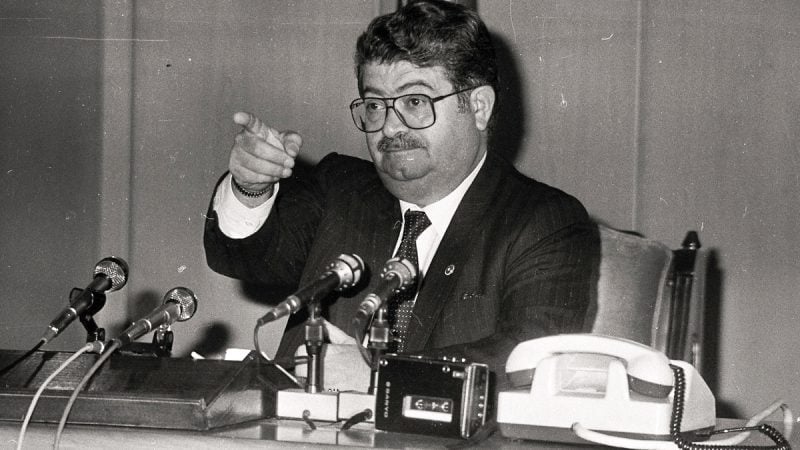Bilgehan Uçak wrote: Are we returning to the “Özal approach” on the Kurdish issue?

The call made by Bahçeli on October 22nd, which brought Öcalan onto the political stage as a powerful actor, had the PKK declare itself dissolved, and organized a disarmament ceremony led by Bese Hozat, led to what Baskın Oran called “the most important event in Turkey’s history.”
This call is undoubtedly a milestone, and years from now, October 22nd will be one of the days that will be remembered most fondly in this land.
With the laying down of arms, one of the most critical stages has been passed and a vital step has been taken towards achieving a solution to lasting peace.
There are no more excuses for Türkiye to crown its regime with democracy.
As I reread the book Mesopotamia Express by Cengiz Çandar, a world-renowned Middle East expert, after more than ten years, I was constantly reminded of Bahçeli's call and what happened next.
I realized that I had missed some of the analyses of the Kurdish issue by Çandar, who also served as President Özal's Middle East advisor, on my first read.
The fundamental conflict of Mesopotamia Express crystallizes in the difference between the President’s and the “state’s” approach to the Kurdish issue.
At the very beginning of the 1990s, which everyone now calls the “lost decade,” a period marked by unsolved murders, chronic inflation, the hollowing out of banks, and a postmodern coup, Özal, as President, intended to put an end to the fledgling Kurdish rebellion, but he found himself facing one wing of the state.
The testimony of Çandar, who witnessed those days, is quite striking :
“As soon as I said, ‘Talabani called…’ he grabbed my right arm with his left hand and said, ‘We’ll talk about this later.’ (…) as I was continuing, he squeezed my arm harder and pointed to me in the front seat with his right index finger, moving it up from the seat level. He said again, ‘We’ll talk about this later,’ and insisted on not letting me speak. In the front seat, right in front of the President, was sitting an aide with the rank of major.”

Çandar continues:
The President of the Republic of Turkey, or rather the 'Commander-in-Chief,' was hesitant to deliver a speech in which the name of a Kurdish leader would be mentioned in the presence of his aide, who held the rank of major. Turgut Özal was a very powerful figure, but when it came to the 'Kurdish issue,' the position and stance of the military in Türkiye prevented even a president like Özal from engaging in even the simplest dialogue.
Özal, who was brave enough to not hesitate to use the term “Kurdish issue,” to suggest that TRT broadcast in Kurdish, and to host Talabani in Çankaya, took very cautious steps even as President, and was sometimes able to implement very little of what he wanted.
Çandar says that Özal believes that "Türkiye needs to establish urgent relations with the Iraqi Kurds," and he also states that this relationship will soon turn into rapprochement.
Moreover, at a time when the state was making every effort to avoid using the words Kurd and Kurdistan, the person at the top of the state did not hesitate to share with those around him that he was ready to break all these taboos.
Ankara's failure to recognize the unsustainability of the Iraqi status quo, its failure to recognize the consequences of the Cold War and their impact on the entire region, particularly Iraq, and its refusal to abandon its conventional approach posed a significant problem for the policies Turgut Özal sought to pursue. This conventional state line in Ankara would, after the death of Turgut Özal in 1993, who stood in stark contrast to it, overcome its greatest resistance and would become even more consolidated throughout the remainder of the 1990s.
In another place he writes:
In the post-Özal era, Turgut Özal's approach to Türkiye's own Kurdish issue was abandoned. The post-Özal years, especially in the context of this last relationship, were years in which Türkiye paid an extraordinarily high price.
While Özal believed that Türkiye could only grow by incorporating all Kurds in the region, the state favored security-oriented "anti-Kurdish" policies, thus causing a potential process to stillborn. Cengiz Çandar's formula of "What is good for the Kurds will also be good for Turkey" was, strangely, adopted not by the state itself, but by its top executives during his time as a consultant.
With Özal's death, the lost years took a horrific turn with the February 28 coup.
The February 28 mentality, which the military predicted would last a thousand years but could barely last even five years, turned the Kurdish issue into an inextricable mess.
Let's listen to Çandar: "The AK Party has also begun to change the policy that was implemented after 1993, which was primarily aimed at preventing the formation of a Kurdish entity in Iraq."
Prime Minister Erdoğan's statement in 2005, "The Kurdish problem is my problem," the Peace Process and the Wise People Committee, and when we failed to find a solution or a lasting peace ground, we experienced lost years again.
Mesopotamia Express made me think that Bahçeli's call might have led the state to a similar line with Özal's, thirty-something years later.
A historic door of opportunity has opened.
Today, there is nothing preventing us from walking that path constructively, decisively and cautiously.
Medyascope




